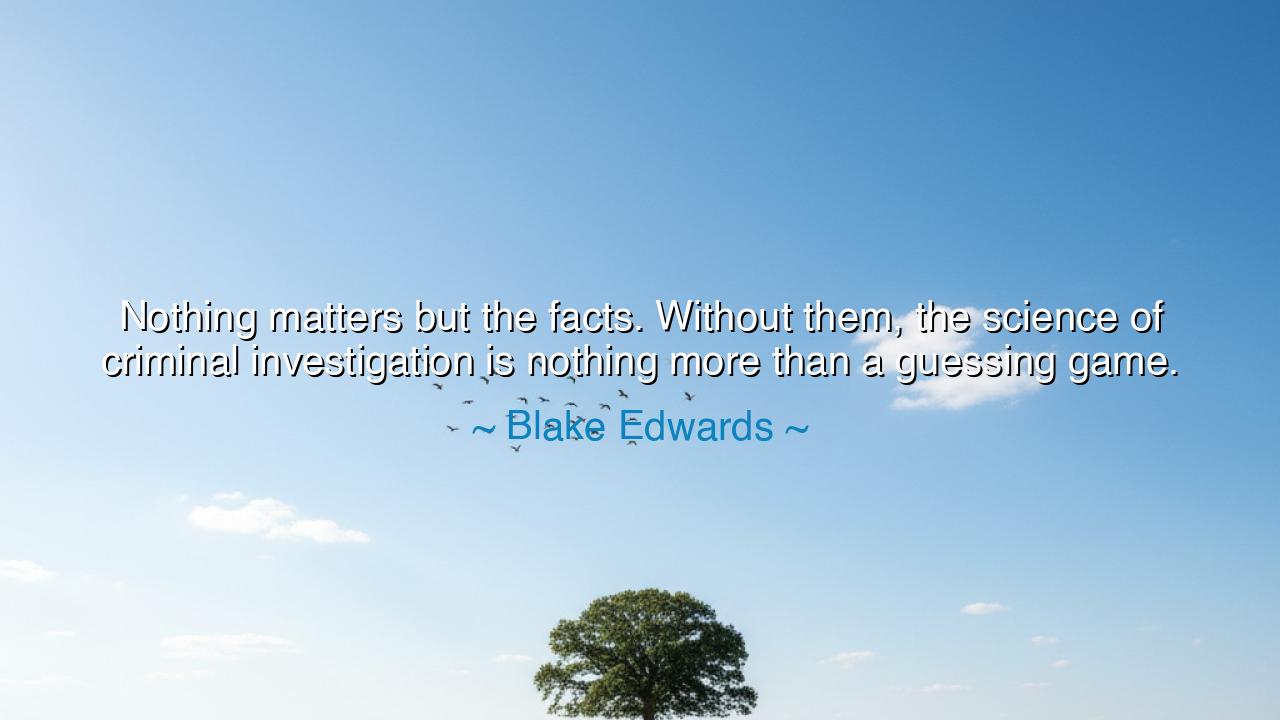
Nothing matters but the facts. Without them, the science of
Nothing matters but the facts. Without them, the science of criminal investigation is nothing more than a guessing game.






"Nothing matters but the facts. Without them, the science of criminal investigation is nothing more than a guessing game." These words, spoken by the sharp and insightful Blake Edwards, echo through the corridors of both science and justice, speaking to the very heart of what it means to search for truth. In the labyrinth of human nature, where emotions, motives, and actions intertwine, it is facts—concrete, undeniable, and unyielding—that serve as the guiding light. Edwards’s words remind us that without these facts, even the most well-intentioned investigation falls prey to speculation, misjudgment, and ultimately, failure. Just as the ancients sought clarity in their philosophical inquiries, so too must we seek the unwavering foundation of truth in the pursuit of justice.
In the age of Plato, when the soul was considered the highest form of knowledge, there was an understanding that the search for truth must be grounded in reasoning and clarity. The philosopher sought to uncover the facts of existence, to strip away the veil of illusion, and to uncover the immutable truths of the universe. It was never enough to base conclusions on speculation or hearsay; only through diligent inquiry and the careful study of facts could one arrive at knowledge. The great minds of old recognized that the pursuit of truth required rigor and a commitment to the evidence, not mere guesses or assumptions. Edwards, in his own way, echoes this ancient call to clarity and precision, especially when it comes to the matter of criminal justice.
The world of criminal investigation, as Edwards alludes to, is no different. Just as the scientists of the past delved into the mysteries of nature through precise experimentation and observation, so too must investigators approach their cases with the same scientific rigor. Facts, those immutable pieces of evidence, form the bedrock upon which the entire process stands. Witness testimony, circumstantial evidence, and even the smallest of clues must be treated with the utmost care, for without them, the investigation risks losing its path. Guesswork, however compelling it may seem in the moment, leads only to confusion and error, far from the clarity that true justice requires.
Consider the story of Sherlock Holmes, the archetype of the modern detective, created by Sir Arthur Conan Doyle. Holmes, a character born from keen observation and logical deduction, represents the very essence of what Edwards speaks about—the reliance on facts. In the stories, it is often Holmes’s meticulous attention to the smallest detail that unravels the truth hidden beneath layers of lies and assumptions. His methods are based on logic, reasoning, and an unwavering commitment to the evidence at hand. The truth does not reveal itself through speculation but through the careful collection and analysis of facts. It is a reminder that when seeking the truth, whether in the halls of justice or the chambers of the mind, we must place our trust not in theories or wishes, but in the hard evidence that stands before us.
History is replete with examples of investigations that went astray because they were built on assumptions rather than facts. One of the most poignant examples lies in the wrongful convictions that have plagued the criminal justice system. Many innocent individuals have been imprisoned because investigators, driven by prejudices or biases, overlooked critical facts or relied on incomplete evidence. It is only through the unflinching pursuit of truth and the rigorous adherence to facts that justice can be served. Just as a scientific experiment must be based on verifiable data, so too must an investigation rest upon the clear foundation of evidence and facts. Without this, the entire endeavor is reduced to nothing more than a guessing game, uncertain and prone to error.
The lesson, then, is both profound and simple: in life, and particularly in the pursuit of justice, facts are paramount. Whether in the halls of courtrooms, the chambers of science, or the streets of our communities, we must seek the truth through evidence and reason, not through speculation or conjecture. This is a call to act with integrity, to respect the process of discovery, and to uphold the sanctity of truth. The facts are not always easy to find, and the search for them may require patience, diligence, and discipline, but they are the only path to real understanding. Without them, we are lost in a sea of uncertainty, with nothing but guesswork to guide us.
In your own life, let facts be your compass. Seek clarity, and do not let your judgments be clouded by emotions or assumptions. Whether you are faced with a decision, a conflict, or a pursuit of knowledge, remember that truth is rooted in facts, and facts alone. Be diligent in your pursuit of truth, and when faced with uncertainty, turn to the evidence. Just as in the world of criminal investigation, where the stakes are often life and death, so too in life must we value and trust the facts above all else. Let them guide you, for in them lies the power to uncover the deepest truths and shape a world based on clarity, justice, and reason.






AAdministratorAdministrator
Welcome, honored guests. Please leave a comment, we will respond soon